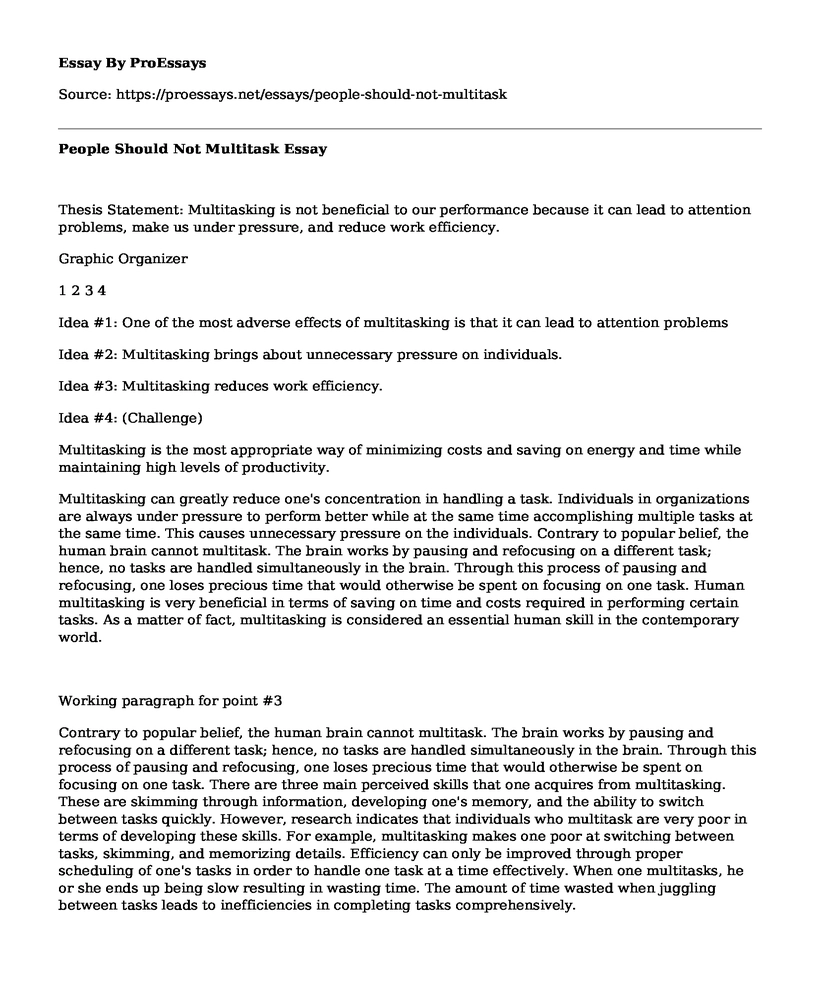Thesis Statement: Multitasking is not beneficial to our performance because it can lead to attention problems, make us under pressure, and reduce work efficiency.
Graphic Organizer
1 2 3 4
Idea #1: One of the most adverse effects of multitasking is that it can lead to attention problems
Idea #2: Multitasking brings about unnecessary pressure on individuals.
Idea #3: Multitasking reduces work efficiency.
Idea #4: (Challenge)
Multitasking is the most appropriate way of minimizing costs and saving on energy and time while maintaining high levels of productivity.
Multitasking can greatly reduce one's concentration in handling a task. Individuals in organizations are always under pressure to perform better while at the same time accomplishing multiple tasks at the same time. This causes unnecessary pressure on the individuals. Contrary to popular belief, the human brain cannot multitask. The brain works by pausing and refocusing on a different task; hence, no tasks are handled simultaneously in the brain. Through this process of pausing and refocusing, one loses precious time that would otherwise be spent on focusing on one task. Human multitasking is very beneficial in terms of saving on time and costs required in performing certain tasks. As a matter of fact, multitasking is considered an essential human skill in the contemporary world.
Working paragraph for point #3
Contrary to popular belief, the human brain cannot multitask. The brain works by pausing and refocusing on a different task; hence, no tasks are handled simultaneously in the brain. Through this process of pausing and refocusing, one loses precious time that would otherwise be spent on focusing on one task. There are three main perceived skills that one acquires from multitasking. These are skimming through information, developing one's memory, and the ability to switch between tasks quickly. However, research indicates that individuals who multitask are very poor in terms of developing these skills. For example, multitasking makes one poor at switching between tasks, skimming, and memorizing details. Efficiency can only be improved through proper scheduling of one's tasks in order to handle one task at a time effectively. When one multitasks, he or she ends up being slow resulting in wasting time. The amount of time wasted when juggling between tasks leads to inefficiencies in completing tasks comprehensively.
References
Lapowsky, I. (2013, April 17). Don't Multitask: Your Brain Will Thank You | TIME.com. Retrieved December 23, 2015, from http://business.time.com/2013/04/17/dont-multitask-your-brain-will-thank-you/
12 reasons to stop multitasking now | Fox News. (2013, June 18). Retrieved December 23, 2015, from http://www.foxnews.com/health/2013/06/18/12-reasons-to-stop-multitasking-now.htmlThe Multitasking Test - ABC Science. (n.d.). Retrieved December 23, 2015, from http://www.multitaskingtest.net.au/the-science/impacts-of-multi-tasking
Cite this page
People Should Not Multitask. (2021, Mar 02). Retrieved from https://proessays.net/essays/people-should-not-multitask
If you are the original author of this essay and no longer wish to have it published on the ProEssays website, please click below to request its removal:
- A Girl Who Changed Into a Boy - Paper Example
- Culture and Society in East Asia Essay Example
- Evaluation of the Application of Educational Theory Paper Example
- Modernity & Colonialism: Examining Contemporary Societies - Essay Sample
- Empathy: An Essential Development Process for Young Children - Essay Sample
- Essay on Early Response to Psychotherapy Predicts Treatment Outcome
- Essay on Planning Company Party: Teamwork & Appraisal Review







